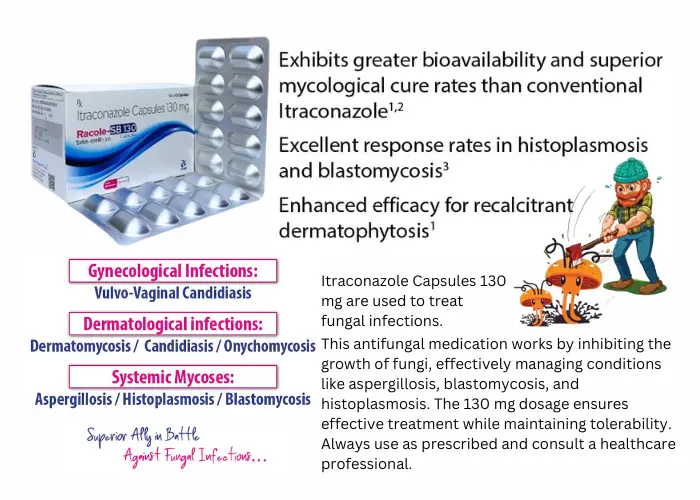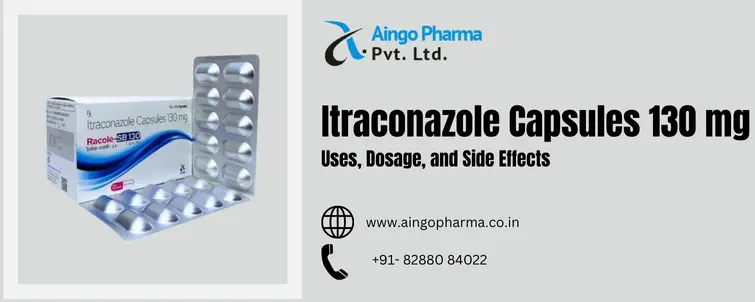Introduction of Itraconazole Capsules 130 mg
Fungal infections can be pesky and persistent, often requiring specialized treatment to fully eradicate. One effective solution is Itraconazole Capsules 130 mg, an antifungal medication designed to combat a broad spectrum of fungal infections. This article delves into the various uses of Itraconazole, its dosage guidelines, benefits, and potential side effects. Whether you’re dealing with a common fungal infection like athlete’s foot or something more severe like systemic infections, understanding how Itraconazole works can help you make informed decisions about your treatment options.
What Are Itraconazole Capsules 130 mg?
Itraconazole is an antifungal medication belonging to the triazole class. It works by inhibiting the synthesis of ergosterol, a critical component of fungal cell membranes. Without ergosterol, the cell membrane becomes permeable and the fungus cannot survive. Itraconazole Capsules 130 mg provide a convenient and effective dosage for treating various fungal infections, both superficial and systemic.
How Does It Work?
Itraconazole targets the enzyme lanosterol 14-alpha-demethylase, essential for converting lanosterol to ergosterol. By inhibiting this enzyme, Itraconazole disrupts the production of ergosterol, compromising the fungal cell membrane’s integrity. This mechanism effectively kills the fungus or inhibits its growth, making it a versatile antifungal treatment.
Uses of Itraconazole Capsules 130 mg
We commonly use itraconazole to treat a wide range of fungal infections, including but not limited to:
- Onychomycosis: Itraconazole effectively treats fungal infections of the nails, commonly known as nail fungus.
- Dermatophytosis: This includes infections like athlete’s foot, jock itch, and ringworm, all caused by dermatophytes.
- Candidiasis: This antifungal agent can manage both oral and vaginal candidiasis.
- Aspergillosis: A more serious fungal infection that affects the lungs and other organs, often seen in immunocompromised individuals.
- Histoplasmosis and Blastomycosis: Itraconazole is effective in treating these systemic fungal infections.
- Sporotrichosis: A fungal infection that affects the skin, lungs, and other organs.
Dosage and Administration
The dosage of Itraconazole Capsules 130 mg depends on the type and severity of the infection. Follow the healthcare provider’s instructions for dosage and duration to completely eradicate the infection.
Typical Dosage Guidelines
- For Onychomycosis: The recommended dosage is usually 200 mg once daily or 130 mg twice daily for 12 weeks.
- For Dermatophytosis: 100-200 mg daily for 2-4 weeks, depending on the infection’s severity and location.
- For Candidiasis: 100-200 mg daily, depending on the severity and location of the infection.
- For Systemic Fungal Infections: The dosage may vary widely, typically ranging from 200-400 mg daily, depending on the specific fungal pathogen and the severity of the infection.
Take Itraconazole Capsules with food to enhance absorption. For certain infections, a healthcare provider may recommend a “pulse-dosing” regimen, where you take the medication for a week and then take a break.
Benefits of Itraconazole Capsules 130 mg
Itraconazole offers several advantages as an antifungal medication:
- Broad-Spectrum Activity: Effective against a wide variety of fungal pathogens, making it versatile for treating multiple types of infections.
- Oral Administration: The capsule form makes it easy to administer, avoiding the need for intravenous therapy in many cases.
- Good Tissue Penetration: Itraconazole penetrates well into tissues, making it effective for both superficial and systemic infections.
- Long Half-Life: The medication stays in the body for an extended period, allowing for more convenient dosing schedules.
Potential Side Effects
While Itraconazole is generally well-tolerated, it can cause some side effects. Being aware of these can help you manage any potential issues that may arise during treatment.
Common Side Effects
- Nausea and Vomiting: These are the most commonly reported side effects. Taking the medication with food may help alleviate these symptoms.
- Headache: Some patients experience mild to moderate headaches.
- Abdominal Pain: Gastrointestinal discomfort can occur, particularly with higher doses.
- Dizziness: Mild dizziness may be experienced, especially when standing up quickly.
Serious Side Effects
- Liver Toxicity: Itraconazole can cause liver damage, particularly in patients with pre-existing liver conditions. Symptoms like jaundice, dark urine, or severe fatigue should be reported to a healthcare provider immediately.
- Heart Issues: Rarely, Itraconazole can cause heart failure, particularly in patients with a history of heart disease. Symptoms like shortness of breath, swelling, or rapid weight gain require immediate medical attention.
- Allergic Reactions: Symptoms like rash, itching, swelling, or difficulty breathing indicate an allergic reaction and require urgent medical care.
Precautions and Considerations
- 1. Medical History: Inform your healthcare provider about your full medical history, especially if you have liver disease, kidney disease, heart conditions, or any history of allergic reactions to antifungals. Itraconazole can have significant interactions with these conditions.
- 2. Drug Interactions: Itraconazole may interact with other medications, including certain antibiotics, antacids, blood thinners, and medications for heart conditions. Always discuss all the medications and supplements you’re currently taking with your doctor to avoid potentially dangerous interactions.
- 3. Pregnancy and Breastfeeding: If you are pregnant, planning to become pregnant, or breastfeeding, consult your healthcare provider before using Itraconazole. This medication can pose risks to the fetus or infant, so it’s important to weigh the benefits and risks with your doctor.
- 4. Liver Function: Regular monitoring of liver function is crucial during treatment, as Itraconazole can cause liver damage. Watch for symptoms like fatigue, dark urine, yellowing of the skin or eyes, and report them to your healthcare provider immediately.
- 5. Dosage and Duration: Take Itraconazole exactly as prescribed. Do not alter the dosage or duration of treatment without consulting your healthcare provider, as improper use can lead to drug resistance or ineffective treatment.
FAQs
- Q: Can Itraconazole Capsules 130 mg be taken with other medications?
A: Itraconazole has numerous drug interactions. Always consult your healthcare provider before starting any new medications.
- Q: What should I do if I miss a dose?
A: If you miss a dose, take it as soon as you remember. If it’s almost time for the next dose, skip the missed dose and continue your regular schedule. Do not double the dose to catch up.
- Q: How long does it take to see results?
A: The time it takes to see improvement depends on the type of infection and its severity. For superficial infections, symptoms may improve within a few days. For systemic infections, it may take longer.
Conclusion
Itraconazole Capsules 130 mg are a potent antifungal medication offering broad-spectrum activity against a wide range of fungal infections. Whether you’re dealing with a common condition like athlete’s foot or a more severe systemic infection, this medication can provide effective treatment. However, as with any medication, it’s essential to use it responsibly and under the guidance of a healthcare provider. Always follow the prescribed dosage and be aware of potential side effects and interactions.
Contact Information:
In conclusion, Contact Aingo Pharma if you want to know regarding Itraconazole Capsules 130 mg Therefore, Below are our contact details.






